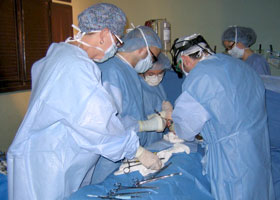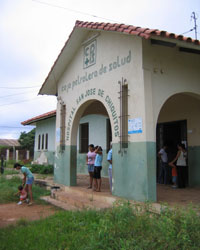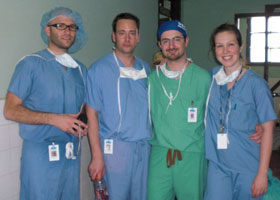Feature Story
Health Center Today, April 14, 2010
Christopher Hughes Awarded Prestigious Paul Farmer Global Surgery Research Fellowship
By Carolyn Pennington

UConn resident Dr. Christopher Hughes (second from left) operating on a patient in a Bolivian Hospital.
When you hear the term "international medicine" you might think of the efforts in poor, third-world countries to prevent infectious diseases such as malaria, TB and HIV. Initially, surgeons were not an integral part of that international push but now more medical schools across the country have incorporated international surgical experiences in their training programs.
This is an area of special interest to Dr. Christopher Hughes, second-year UConn general surgery resident. Hughes recently gave a talk at the Health Center, "Not Less So: Why International Surgery Matters," and has participated in several international surgery and medical trips to Belize, Bolivia, Honduras, India, and Ecuador.
"Weíre kind of at the convergence of a lot of different forces involving international surgery at this point," explains Hughes. "The documented need for surgery in resource-poor settings around the world is escalating and people are actually looking into ways of capturing what those needs are for poor people and poor countries around the world."

Bolivian Hospital where Dr. Christopher Hughes, Paul Farmer Global Surgery Research Fellowship recipient, treated local residents.
Hughes will spend the next two years researching and measuring those needs. He was recently named the Paul Farmer Global Surgery Research Fellow at the Childrenís Hospital in Boston. As part of this honor, he will spend time working in Haiti and Africa with another doctor who was awarded a clinical fellowship.
"I will assist the clinical fellow with some of the surgeries and Iíll also figure out how the practical day-to-day medical care works better or worse for the community," explains Hughes. "Iíll be focusing on how to measure the outcomes and Iíll also get more formally involved in the process of educating the local health care personnel."
Figuring out what the need is in the poorest regions of the poorest countries will be the challenge. In a poor country, the surgical services are typically only available in the cities - for those who can pay. Record-keeping in the rural areas is usually nonexistent.
Hughes says the poorest third of the world receives only three percent of the worldís surgical care. Those are the countries that spend less than $100/per person/per year on health care, while the richest third receives three-fourths of the care.
Most general surgeries in poor countries involve removing gall bladders, appendices, hernias and obstetrical procedures like emergency c-sections and hysterectomies. One of the fastest- growing fields is plastic surgery, involving mainly reconstructive procedures for congenital anomalies such as cleft lip and palate.

UConn resident and Paul Farmer Global Surgery Research Fellowship recipient, Dr. Christopher Hughes (far left), pictured with other members of his surgical team working at a Bolivian Hospital last year.
Hughes believes in the future you will find more surgical epidemiologists who look for surgery to fit in a broader context of the overall health care system. "The success of medical missions is often judged by how many surgeries the doctors performed," explains Hughes. "But when we leave and dump the patientsí complications and follow-up care on the community doctor who is already overwhelmed, does that benefit the community as a whole?"
Hughes says the fellowship, which is being supported by UConn, Hartford Hospital, and the St. Francis Foundation, is always something he has wanted to do. "Itís medicine at its most pure in a lot of ways. Itís providing care to those who strictly need care so itís easy to get excited about something like that."


